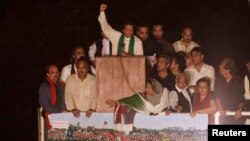Leading opposition politician Imran Khan urged Pakistanis on Sunday not to pay taxes or utility bills as a protest against the government and vowed to force the country's “corrupt” prime minister to step down this week.
“After two days ... your time is up,” Khan shouted to thousands of supporters at a rally in central Islamabad.
Police estimated on Sunday that around 55,000 people occupied two streets in the center of the Pakistani capital as part of separate protests led by Khan and cleric Tahir ul-Qadri.
Both men say they will stay in the streets until Prime Minister Nawaz Sharif, whom they condemn as corrupt, resigns. Qadri gave him a 48-hour ultimatum on Saturday night.
Sharif's landslide election win marked the first democratic transfer of power in the history of the nuclear-armed nation of 180 million people. But barely a year after taking power, he has struggled to overcome daily power cuts, a sluggish economy and a Taliban insurgency. Anti-Western militant groups have been growing in strength, worrying Pakistan's allies.
Khan, a former international cricket star, did not repeat a call for protesters to march on parliament, saying he did not want to provoke violence.
“We will go for civil disobedience and will not pay taxes or utility bills till the time Nawaz Sharif resigns,” he said.
Less than one percent of Pakistanis pay income tax, and the last time Pakistan prosecuted someone for income tax evasion was more than 25 years ago.
Khan alternated between urging his supporters to protest peacefully and warning authorities he might not be able to control them.
“After two days I will tell [Prime Minister] Nawaz Sharif that I will not be able hold the people back,” Khan said.
Khan said on Saturday that he was struggling to hold his supporters back from marching on the “Red Zone,” an enclave that is home to top government buildings like Parliament and the Supreme Court and most Western embassies.
Many of the young men at Khan's protest said they were eager to push against the fortified lines of riot police if Khan commanded.
“I told my parents, if I am martyred, pray for me,” said student Muhammed Qasim, 21, his goatee painted in the red and green colors of Khan's party.
Riot police wearing body armor and carrying tear gas stacked shipping containers on top of each other and covered them with oil to prevent people from climbing them behind the stage where Khan spoke.
‘Insecure country’
The country's information minister, Pervez Rashid, told local television station Geo the government would not permit protesters to overrun government offices or the Red Zone.
“If they go to the Red Zone, will the world see it?” Rashid asked. “This is our internal issue, but if they go into the Red Zone, the issue will be heard in capitals across the world via their embassies. And there will be alarm bells in the capitals, signaling that Pakistan has turned into an insecure country.”
Sharif's relationship with the powerful military has been poor, leading some in his government to suggest elements in the military are directing the protests to weaken the government and discourage policies it disapproves of.
Those include the prosecution for treason of former army chief and president Pervez Musharraf, who overthrew Sharif in a coup in 1999, ushering in a decade of military rule.
Despite Pakistan's history of coups, few feel the military wants to oust Sharif, however. The Supreme Court issued a warning on Friday against “unconstitutional” action.
Some analysts say the unrest has erupted because the opposition senses Sharif is vulnerable, not only over his rocky relations with the military, but also because of dithering over peace talks with the Taliban and failure to fill key ministries more than a year after taking office.
Qadri and Khan both arrived in Islamabad late on Friday after a two-day procession of tens of thousands of people through Punjab province, heartland of support for Sharif. Their protests have remained separate because the two have different supporters and plans for what should happen if Sharif steps down.
Qadri's supporters have set up camp on the capital's main thoroughfare, Jinnah Avenue, forcing many businesses to close. Khan's protest is on an adjacent street, in the area of Aabpara Chowk.
“We are giving 48 hours for the government to resign and dissolve the assemblies and present themselves before the law,” Qadri said Saturday night.
“Otherwise the people will decide and I will not be responsible.”





